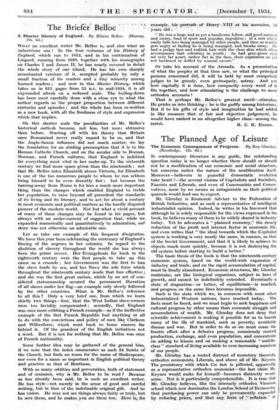The Briefer Bell& WHAT an excellent writer Mr. Belloc is,
and also what an industrious one In the four •volumes of his History of England, which run to 1612, and in his continuation of Lingard, running from 1688, together with his monogriPhs on Charles I and James II, he has nearly covered in detail the whole story of our island. He has his own sharply accentuated versions of it, accepted probably by only a small fraction of his readers and a tiny minority among learned readers ; and now in this Shorter History, which takes us in 615 pages from 55 B.C. to mid-1934, it is all expounded afresh on a reduced scale. The boiling-down has been most carefully done with a close eye to what the author regards as the proper. proportion between different centuries and episodes ; and the whole has been re-written as a new book, with all the freshness of style and expression which that implies.
On this shorter scale the peculiarities of Mr. Belloc's historical outlook become, not less, but more obtrusive than before. Starting off with his theory that Britain once Romanized never really ceased to be so, and that the Anglo-Saxon influence did not much matter, we lay the foundation for an abiding presumption that it is to the Roman Catholic Church, and on the secular side to Roman, Norman, and French cultures, that England is indebted for everything most vital in her make-up. To the sixteenth century we find more space given than the nineteenth ; not that Mr. Belloc rates Elizabeth above Victoria, for Elizabeth is one of the too numerous people to whom he can seldom bring himself to be even decently fair ; but because the turning-away from Rome is for him a much more important thing than the changes which enabled England to treble her population, to raise beyond all precedent the standards of its living and its literacy, and to act for about a century in most economic and political matters as the hardly disputed pioneer of the modern world. Not but what a vivid account of many of these changes may be found in his pages, but always with an under-current of suggestion that, while, we expanded numerically and quantitatively to admiration, our story was not otherwise an admirable one.
Let us take one example of this frequent denigration. We have this year been celebrating the centenary of England's fleeing of the negroes in her colonies. In regard to the Obolition of slavery throughout the world she has always been the prime mover. Her Evangelicals far back in the eighteenth century were the first people to take up this cause as a crusade ; her Government was the first to ban the slave trade by sea, and her Navy the sole force which throughout the nineteenth century made that ban effective ; and she was the first great nation, which by an act of con- sidered statesmanship secured the permanent liberation Of all slaves under her flag—an example only slowly followed by the other countries. What is Mr. Belloc's reference to • all this ? Only a very brief one, from which we learn, chiefly two things—first, that the West Indian slave-owners were too lavishly compensated ; secondly, that England was once more cribbing a French example—as if the ineffective example of the first French Republic had anything at all to do with the convictions and policy of men like Clarkson and Wilberforce, which went back to home sources far behind it. Of the grandeur of the English initiatives not a word. But it is not for nothing that Mr. Belloc was once of French nationality.
Some further idea may be gathered of the general bias, if we note that the index enumerates as such 24 Saints of the Church, but finds no room for the name of Shakespeare, nor even for a name so important in English political theory and practice as that of Bentham.
. With so many oddities and perversities, both of statement and of omission, why is Mr. Belloc to be read ? Because as has already., been said, he is such an excellent writer. He has style—not merely in the sense of good and careful writing, but in that of the indefinable original gift. And he has vision. He may not see things always fairly or truly, but he sees them; and he makes you see them too.- _Here la, for example, his-Tortrait- of Henry at his 'accession, 18
Yeats old : •
" He was a large and as yet a handsome fellow, still good-natured and merry, fond of sport and popular, impulsive.; of a sort which easily falls into being managed by other people, and then as readily gets angry at finding he is being managed, and breaks away. He had a pudgy face and reddish hair with the clear skin which often accompanies that colouring in youth ; he had grey-green eyes. set very far apart,' rather flat in .the.face, their expression as yet' not hardened or dulled by sensual excess."
Or take his account of the Armada. As a presentation of what the peoples at that time saw, or what the principal persons concerned did, it will be held by most competent
judges to be grossly, even grotesquely, astray. And yet how capitally it is -done, how compactly every word of it fits together, and how stimulating' is the challenge to more' orthodox accounts!
That is perhaps Mr. Belloc's greatest merit—stimulus.' He pricks us into thinking ; he is the gadfly among historians. But if to his gifts of style and imagination he had added in like measure that of fair and objective judgement, he would have ranked in "an altogether higher class—among the


















































 Previous page
Previous page